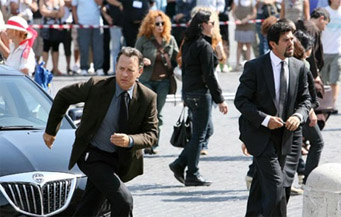Movie Review: Angels & Demons
By Matthew Huntley
May 22, 2009
BoxOfficeProphets.com

The difference between Angels & Demons and its predecessor, The Da Vinci Code, is the former isn't as self-conscious of its literary source. It doesn't have as much to live up to, so the pressure is off. Director Ron Howard treats the material less like historical non-fiction and more like a slick Hollywood thriller and the approach works splendidly. Angels glides along more confidently and coherently, and although I haven't read Dan Brown's novel, which was technically written first, I bet it reads more cinematically than Da Vinci, which never seemed adaptable for the big screen. Fortunately, Angels does, which is the first step toward making a good movie out of it.
Tom Hanks reprises his role as Professor Robert Langdon, the pragmatic professor of symbology from Harvard University. This time, instead of being accused of murder, he's summoned by the Vatican to help find four kidnapped preferiti, cardinals considered to be the front-running papal candidates after his Holiness recently died. The Swiss Guard has reason to believe the preferiti were taken by the resurfaced Illuminati, the secret society made up of mathematicians and astronauts who sought scientific truth over religion. Langdon mentions how the Catholic Church purged members of the Illuminati hundreds of years ago because of their conflicts with the church. Now they see the Pope's death as an opportunity for revenge and a way to defile the church's reputation.
The kidnappers threaten to publicly execute each of the four cardinals on the hour beginning at 8 p.m. and then detonate a bomb at midnight that could potentially wipe out all of Vatican City. The bomb is made up of antimatter forged by a team of scientists from Geneva, Switzerland, among them Vittoria Vetra (Ayelet Zurer), who coins the substance "The God Particle" because its formation represents "the moment of creation." The antimatter was recently stolen and is now hidden within the city. If the canister's battery gives out and the antimatter comes into contact with regular matter, the result would be cataclysmic. Langdon believes he can find the kidnapped cardinals and the bomb by following the Path of Illumination, a series of clues that leads to the Illuminati's secret meeting place.
Camerlengo Patrick McKenna (Ewan McGregor), overseer of the conclave that votes for the new pope, grants Langdon access to the Vatican archives so he and Vittoria can start on the path. And so, we get another Da Vinci-style plot that involves Langdon decoding hidden messages and surviving unbelievable situations and chase scenes. Unlike Da Vinci, though, Angels focuses more on action and less on excessive exposition and laborious dialogue. It's silly, yes, but also entertaining.
I don't think many viewers will be rushing home to Wikipedia to look up whether or not the claims from David Koepp and Akiva Goldsman's screenplay are real or not. Koepp and Goldsman have simply turned Dan Brown's novel into a procedural thriller that does a good job of manipulating us with its story. Howard, coming off the intense and credible Frost/Nixon, gives this lavish production a lot of energy and a constant tempo to keep us involved.
I would have preferred more screen time be devoted toward Langdon's spiritual side. As it is, we still know little about this man outside of his profession, and the movie has some opportunities to generate real pathos when the camerlengo asks him if he believes in God, but these scenes are too brief and never revisited. I didn't think Hanks was particularly well cast in Da Vinci, but here he seems more suited for the role, probably because the movie offers him more of a human side, even humor, which Hanks emits naturally. He's aided by the wonderful Armin Mueller-Stahl, who plays one of the presiding cardinals. It's a pleasure just to hear Mueller-Stahl speak. He and Ian McKellen have something in common.
What's impressive is how the movie actually seems re-watchable - rare for today's movies. It's easy to follow the first time around, but there are certain plot threads that may have gotten missed and you're curious to find them during a second viewing. And however preposterous it may seem, Howard finds a way to balance the plot with a certain level of reality so we don't end up laughing at it. One scene near the end walks a fine line of coming off as completely ridiculous, but Howard makes it acceptable.
Angels & Demons ultimately works because it doesn't pretend it's anything more than a Hollywood blockbuster. Because of that, it doesn't get on our nerves or become frustrating to watch like The Da Vinci Code, which often marveled in its own self-importance. Angels is skillful, well-paced and often beautiful to look at thanks to Salvatore Totino's cinematography. If it's something deeper and more enlightening you seek, try reading a history book.